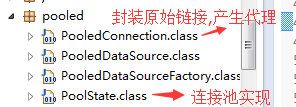一个由session.close()引发的血案
最近接手了个新项目, 项目一直存在使用已关闭的连接 异常问题.
上图:
项目环境:
1.使用的是 mybatis-3.2.6.jar orm框架
2.使用mybatis 默认提供的 pooled 连接池
配置 详见:
http://www.cnblogs.com/caoyc/p/5574827.html
问题分析:
1. 问题猜测:
因为公司连接mysql 中间有层F5的代理,考虑是不是mysql的wait_timeout 已过期,但是F5的与应用的连接还是active状态
解决方案:
修改配置文件中 poolPingConnectionsNotUsedFor 参数使其小于F5的time_out
但问题依旧
2.问题猜测:
线程池实现有bug,导致有极端情况没有判断出连接是否可用,而继续存活于idleConnections 池中
解决方案:
跟踪源码,打开日志等级为debug.
通过跟踪有问题的connection 的hashcode (554300411) 发现在
其中一段时间中 没有Returned connetion ..
可以发现 正常的checkout - return 都相差不到100ms
而从这条日志开始 checkout 到下一次return
相隔了有5分钟!!!!!
继续排查
cat xxx.log |grep "[03-02 19:12:36 103 DEBUG] [pool-37-thread-1] datasource.pooled.PooledDataSource.popConnection 369 - Checked out connection 554300411 from pool." -A 50 --color
发现执行了 这方法.就再也没有在5分钟之内return poll 了。
开始怀疑是 慢sql 导致的。但是日志可以看出整个查询也就消耗了4ms
next
跟踪代码吧。
SqlSession session = sqlSessionFactory.openSession(true);
....
catch (Exception e) {
log.error("xxxx", e);
response.setResponseCode(ResponseCode.SYSTEM_ERROR.getCode());
response.setErrorMessage("xxxx");
throw e;
}
没有 调用
session.close() !!!!!!!!!!!!
修改掉。好了。问题fix了。
那么问题来了。为什么没有调用session.close()会出现这个问题呢?
================我们来看下 mybatis对于close() 干了什么 =====================
public class DefaultSqlSession implements SqlSession {
public void close() {
try {
/** 关键 */
executor.close(isCommitOrRollbackRequired(false));
dirty = false;
} finally {
ErrorContext.instance().reset();
}
}
}

public abstract class BaseExecutor implements Executor {
public void close(boolean forceRollback) {
try {
try {
rollback(forceRollback);
} finally {
/** 关键 */
if (transaction != null) transaction.close();
}
} catch (SQLException e) {
// Ignore. There's nothing that can be done at this point.
log.warn("Unexpected exception on closing transaction. Cause: " + e);
} finally {
transaction = null;
deferredLoads = null;
localCache = null;
localOutputParameterCache = null;
closed = true;
}
}
}

public class JdbcTransaction implements Transaction {
public void close() throws SQLException {
if (connection != null) {
resetAutoCommit();
if (log.isDebugEnabled()) {
log.debug("Closing JDBC Connection [" + connection + "]");
}
/** 关键 */
connection.close();
}
}
}
找到关键了。最终执行了 connection.close(). 那 connection 是由谁生成的呢?
我们从头开始.
SqlSession session = sqlSessionFactory.openSession(false);public class DefaultSqlSessionFactory implements SqlSessionFactory {
private SqlSession openSessionFromDataSource(ExecutorType execType, TransactionIsolationLevel level, boolean autoCommit) {
Transaction tx = null;
try {
/** 关键 */
final Environment environment = configuration.getEnvironment();
final TransactionFactory transactionFactory = getTransactionFactoryFromEnvironment(environment);
/** 关键 */
tx = transactionFactory.newTransaction(environment.getDataSource(), level, autoCommit);
final Executor executor = configuration.newExecutor(tx, execType);
return new DefaultSqlSession(configuration, executor, autoCommit);
} catch (Exception e) {
closeTransaction(tx); // may have fetched a connection so lets call close()
throw ExceptionFactory.wrapException("Error opening session. Cause: " + e, e);
} finally {
ErrorContext.instance().reset();
}
}
}
这两段代码就决定了最终使用什么样的datasource
由于前面配置以及告知 使用 所以 我们看下 pooledDataSource的实现

/**
* 该类实现了动态代理接口
*/
class PooledConnection implements InvocationHandler {
/** 构造器中 注意有个proxyConnection 代理了Connection 使执行connection任何方法
* 都会执行invoke方法
*/
public PooledConnection(Connection connection, PooledDataSource dataSource) {
this.hashCode = connection.hashCode();
this.realConnection = connection;
this.dataSource = dataSource;
this.createdTimestamp = System.currentTimeMillis();
this.lastUsedTimestamp = System.currentTimeMillis();
this.valid = true;
this.proxyConnection = (Connection) Proxy.newProxyInstance(Connection.class.getClassLoader(), IFACES, this);
}
/**
* invoke中对close做了特殊处理,是close调用时 执行的是pushConnection操作
*/
public Object invoke(Object proxy, Method method, Object[] args) throws Throwable {
String methodName = method.getName();
if (CLOSE.hashCode() == methodName.hashCode() && CLOSE.equals(methodName)) {
dataSource.pushConnection(this);
return null;
} else {
try {
if (!Object.class.equals(method.getDeclaringClass())) {
// issue #579 toString() should never fail
// throw an SQLException instead of a Runtime
checkConnection();
}
return method.invoke(realConnection, args);
} catch (Throwable t) {
throw ExceptionUtil.unwrapThrowable(t);
}
}
}
}
public class PooledDataSource implements DataSource {
/** 从 空闲的连接池中获取可用连接 (省部分代码)*/
private PooledConnection popConnection(String username, String password) throws SQLException {
while (conn == null) {
synchronized (state) {
if (state.idleConnections.size() > 0) {
// Pool has available connection
conn = state.idleConnections.remove(0);
..............
} else {
// Pool does not have available connection
if (state.activeConnections.size() < poolMaximumActiveConnections) {
// Can create new connection
conn = new PooledConnection(dataSource.getConnection(), this);
@SuppressWarnings("unused")
//used in logging, if enabled
Connection realConn = conn.getRealConnection();
if (log.isDebugEnabled()) {
log.debug("Created connection " + conn.getRealHashCode() + ".");
}
} else {
// Cannot create new connection
............
if (longestCheckoutTime > poolMaximumCheckoutTime) {
// Can claim overdue connection
.......
state.activeConnections.remove(oldestActiveConnection);
if (!oldestActiveConnection.getRealConnection().getAutoCommit()) {
oldestActiveConnection.getRealConnection().rollback();
}
/** 这里默认构造器有个小坑 会重置 LastUsedTimestamp */
conn = new PooledConnection(oldestActiveConnection.getRealConnection(), this);
oldestActiveConnection.invalidate();
}
}
}
if (conn != null) {
if (conn.isValid()) {
if (!conn.getRealConnection().getAutoCommit()) {
conn.getRealConnection().rollback();
}
conn.setConnectionTypeCode(assembleConnectionTypeCode(dataSource.getUrl(), username, password));
conn.setCheckoutTimestamp(System.currentTimeMillis());
conn.setLastUsedTimestamp(System.currentTimeMillis());
state.activeConnections.add(conn);
} else {
if (log.isDebugEnabled()) {
log.debug("A bad connection (" + conn.getRealHashCode() + ") was returned from the pool, getting another connection.");
}
...........
conn = null;
...........
}
}
}
}
.............
}
return conn;
}
/** 把激活连接从 活动连接池中移除 放回到 空闲连接池中 */
protected void pushConnection(PooledConnection conn) throws SQLException {
synchronized (state) {
state.activeConnections.remove(conn);
..........
state.idleConnections.add(newConn);
............
}
}
}
问题很明显了。如果不调用close 方法
当前连接不会释放回空闲连接池中,一直存在于 活动连接池中,
当空闲连接池耗光之后 pop 会从
活动连接池
中选取第一个连接
返回给应用.而这个时候 这个连接从最后次使用到拿出来可能过了
好几分钟了。就真的是个处于关闭状态的连接了




